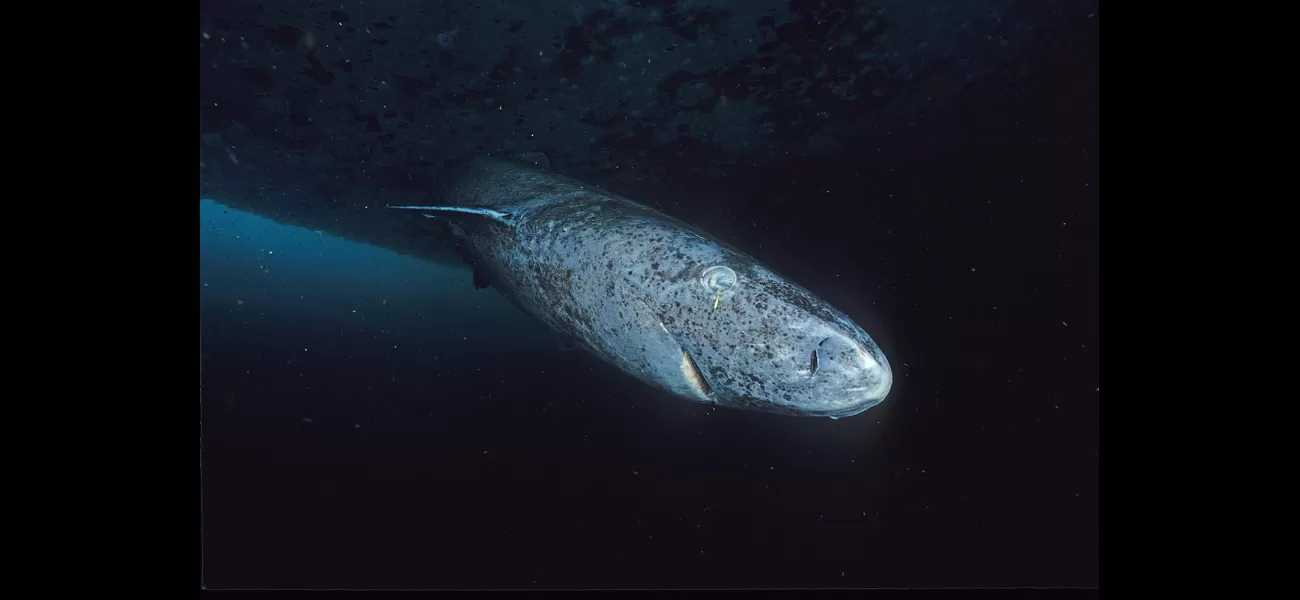Ancient and strange, this shark may unlock the key to staying young.
Some species can survive for up to 500 years.
July 4th 2024.

Have you ever heard of the mysterious Greenland shark? It's a rare species that has been known to live for up to 500 years, making it a potential key to unlocking anti-aging secrets for humans. But that's not the only thing that makes this shark so fascinating. Its appearance and behavior are also quite unique.
In an article in the New Yorker, the Greenland shark was described as one of nature's "least elegant inventions". With its lumpy body, stunted pectoral fins, and blunt snout, it certainly doesn't win any beauty contests. And to make matters worse, many of these sharks have worm-like parasites dangling from their eyes, giving them a rather dull-witted appearance. But despite all this, they have the last laugh with their impressive lifespan of 270 years or more.
Recently, scientists have discovered that the metabolic activity in their muscles may hold the key to their extraordinary longevity. This makes the Greenland shark the longest-living vertebrate species in the world. Researchers are now studying these sharks in the hopes of finding ways to protect them from the effects of climate change, and possibly even uncovering insights that could benefit human health.
Lead researcher Ewan Camplisson explains, "We want to understand what adaptations they have that allow them to live so long." It was previously thought that their cold environment and slow movement were responsible for their long lifespan. However, further investigation has shown that there may be other factors at play.
In order to measure the sharks' metabolism, Camplisson and his team conducted enzyme tests on preserved muscle tissue samples from different ages of Greenland sharks. Surprisingly, they found no significant variation in metabolic activity between the different ages, suggesting that their metabolism does not decrease over time. This is quite different from most animals, which tend to show some decline in metabolic activity as they age.
But the mystery doesn't stop there. The team also discovered that the sharks' enzymes were more active at higher temperatures. This suggests that the shark's red muscle metabolism is not specially adapted for their polar environment, which raises concerns about their ability to adapt to a changing climate.
As Camplisson explains, "A female Greenland shark may not become sexually mature until it is 150-years-old, and with such a long generation time, the species will have far less of a chance to adapt to anthropogenic changes in their environment."
But their research is not just about understanding the Greenland shark. It also has potential implications for human health. Camplisson notes, "By studying the Greenland shark and its heart, we may be able to better understand our own cardiovascular health." With age-related diseases becoming increasingly common, this research could provide valuable insights into how to combat these issues.
These fascinating findings were presented at the Society for Experimental Biology annual conference in Prague, Czech Republic. And as the research continues, it is clear that the enigmatic Greenland shark still has many secrets waiting to be uncovered. Who knows what other mysteries this ancient species holds?
In an article in the New Yorker, the Greenland shark was described as one of nature's "least elegant inventions". With its lumpy body, stunted pectoral fins, and blunt snout, it certainly doesn't win any beauty contests. And to make matters worse, many of these sharks have worm-like parasites dangling from their eyes, giving them a rather dull-witted appearance. But despite all this, they have the last laugh with their impressive lifespan of 270 years or more.
Recently, scientists have discovered that the metabolic activity in their muscles may hold the key to their extraordinary longevity. This makes the Greenland shark the longest-living vertebrate species in the world. Researchers are now studying these sharks in the hopes of finding ways to protect them from the effects of climate change, and possibly even uncovering insights that could benefit human health.
Lead researcher Ewan Camplisson explains, "We want to understand what adaptations they have that allow them to live so long." It was previously thought that their cold environment and slow movement were responsible for their long lifespan. However, further investigation has shown that there may be other factors at play.
In order to measure the sharks' metabolism, Camplisson and his team conducted enzyme tests on preserved muscle tissue samples from different ages of Greenland sharks. Surprisingly, they found no significant variation in metabolic activity between the different ages, suggesting that their metabolism does not decrease over time. This is quite different from most animals, which tend to show some decline in metabolic activity as they age.
But the mystery doesn't stop there. The team also discovered that the sharks' enzymes were more active at higher temperatures. This suggests that the shark's red muscle metabolism is not specially adapted for their polar environment, which raises concerns about their ability to adapt to a changing climate.
As Camplisson explains, "A female Greenland shark may not become sexually mature until it is 150-years-old, and with such a long generation time, the species will have far less of a chance to adapt to anthropogenic changes in their environment."
But their research is not just about understanding the Greenland shark. It also has potential implications for human health. Camplisson notes, "By studying the Greenland shark and its heart, we may be able to better understand our own cardiovascular health." With age-related diseases becoming increasingly common, this research could provide valuable insights into how to combat these issues.
These fascinating findings were presented at the Society for Experimental Biology annual conference in Prague, Czech Republic. And as the research continues, it is clear that the enigmatic Greenland shark still has many secrets waiting to be uncovered. Who knows what other mysteries this ancient species holds?
[This article has been trending online recently and has been generated with AI. Your feed is customized.]
[Generative AI is experimental.]
0
0
Submit Comment





